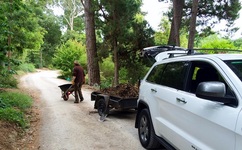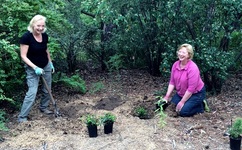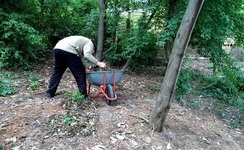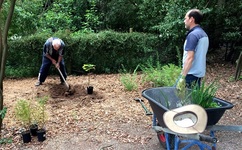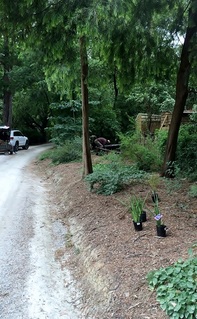Bickleigh Vale
Bickleigh Vale Roadside Vegetation Management Plan
December 2010
In 2010, preparation of this report was commissioned by Heritage Victoria in association with the Yarra Ranges Council and Friends of Edna Walling.
Background and Aims of the Report
The vegetated road reservations in the Bickleigh Vale Estate are in need of programs for weed management and renewal of senescent trees and shrubs in order to preserve the country lane character as originally envisaged by Edna Walling. Some of the trees and shrubs were planted in the 1930s and are now coming to the end of their useful lives. The growth of large trees has caused overshadowing of gardens and changed conditions for understorey plants. Some trees have died and require removal; others need deadwooding of dangerous branches. Smaller trees and shrubs have either been planted piecemeal by residents or have self‐seeded from original plants. The cultural significance of the roadside vegetation is also under threat due to reduced rainfall or drought, changes in access to adjacent properties, and safety requirements of public authorities. This report is intended to provide a set of management guidelines, for both the Shire of Yarra Ranges and the Friends of Edna Walling, to maintain and renew the “Edna Walling landscape character” of the roadsides.
Ownership and copyright
Ownership and copyright of the Management Plan including all reports, maps, plans, photographs and the like supplied to the Steering Committee by way of progress, draft, or final report or publication, (including the original of the final report) shall be vested in the Shire of Yarra Ranges and Heritage Victoria.
Acknowledgement
The production of the Bickleigh Vale Roadside Vegetation Management Plan was carried out with funds made available by the Heritage Council of Victoria and assistance from the Friends of Edna Walling, Shire of Yarra Ranges and Heritage Victoria.
Background and Aims of the Report
The vegetated road reservations in the Bickleigh Vale Estate are in need of programs for weed management and renewal of senescent trees and shrubs in order to preserve the country lane character as originally envisaged by Edna Walling. Some of the trees and shrubs were planted in the 1930s and are now coming to the end of their useful lives. The growth of large trees has caused overshadowing of gardens and changed conditions for understorey plants. Some trees have died and require removal; others need deadwooding of dangerous branches. Smaller trees and shrubs have either been planted piecemeal by residents or have self‐seeded from original plants. The cultural significance of the roadside vegetation is also under threat due to reduced rainfall or drought, changes in access to adjacent properties, and safety requirements of public authorities. This report is intended to provide a set of management guidelines, for both the Shire of Yarra Ranges and the Friends of Edna Walling, to maintain and renew the “Edna Walling landscape character” of the roadsides.
Ownership and copyright
Ownership and copyright of the Management Plan including all reports, maps, plans, photographs and the like supplied to the Steering Committee by way of progress, draft, or final report or publication, (including the original of the final report) shall be vested in the Shire of Yarra Ranges and Heritage Victoria.
Acknowledgement
The production of the Bickleigh Vale Roadside Vegetation Management Plan was carried out with funds made available by the Heritage Council of Victoria and assistance from the Friends of Edna Walling, Shire of Yarra Ranges and Heritage Victoria.
Initial Implementation
In 2011, the initial works program (section 7 of the Plan) was implemented by the Shire of Yarra Ranges with support from Friend of Edna Walling. This involved complete clean-out of weeds and weedy trees and mulching of the entire roadside reserve. The Shire then supplied hundreds of replacement plans which Friend of Edna Walling planted during the quarterly working bee in August.
As the plants became established, by the next year when Bickleigh Vale hosted an Open Gardens Australia event, the road had never looked better!
As the plants became established, by the next year when Bickleigh Vale hosted an Open Gardens Australia event, the road had never looked better!
Ongoing Management Program
As noted in the Plan (section 7), future works will be required on an on‐going basis and will rely on monitoring, vegetation maintenance and replacement planting by Friends of Edna Walling. It is expected that quarterly working bees should be adequate to handle most issues except for emergencies. The key activities are:
Safety Issues
Weed Management
Aesthetic Management
Road Management
Monitoring
Safety Issues
- Friends of Edna Walling should notify the Shire of Yarra Ranges if any urgent aboricultural works are required. This may be the result of damage from high winds or storms resulting in fallen trees or large branches dropping. Trees which die due to drought, disease or other reasons may also need removal.
- Friends of Edna Walling should provide follow‐up pruning of vegetation cut back by the Shire of Yarra Ranges for traffic visibility or for overhead vehicle clearances.
Weed Management
- Weeding will be required on a regular basis. Liaise with the Shire of Yarra Ranges for pick up and removal of plant debris and rubbish.
- Mulch replenishment will be required on at least an annual basis. Liaise with the Shire of Yarra Ranges for supply and delivery of mulch. As noted above, mulch should not contain any weed seeds.
Aesthetic Management
- Pruning will be required for both trees and shrubs to maintain pedestrian and traffic visibility and to ensure that plant growth does not create nuisance. Vigorously‐ growing plants may need to be cut back to avoid overshadowing or out‐competing neighboring vegetation. Climbers need to be controlled and kept off tree trunks.
- Roses should be pruned on an annual basis.
- Replanting will be necessary to replace dead, diseased or removed plants or to thin out vegetation that has become too dense. Similarly, some plants may need to be removed if they fail to thrive under shade conditions created by larger trees. Note that replacements do not necessarily have to be with the same species; the aim should always be to retain Edna Walling’s vision for a country lane.
Road Management
- The Shire of Yarra Ranges is responsible for ongoing road maintenance: surface grading, replenishing the Lilydale toppings surface, an annual application of dust suppressant, and maintenance of drains. Friends of Edna Walling need to advise council if any works require urgent attention.
Monitoring
- Monitoring involves regular visual inspections, the keeping of records or actions carried out, and photographic records
- Photo points should be set up for images to be recorded from the same position at regular intervals to record vegetation growth and changes; these should be taken on a yearly basis.
- Records should also be kept of all maintenance actions taken, including planting species, numbers and locations.
Quarterly working bee weeding and pruning guidelines
Weeding Guidelines
- Remove all pittosporum undulatum
- Remove all privet
- Remove all ivy
- Monitor growth of jasmine on fencelines and cut back as necessary to ensure it doesn’t get out of control; Cut back where growing up trees
Pruning Guidelines
- Generally prune shrubs with stems inside 2m from the road edge to maintain visibility for traffic
- Remove sucker growth from shrubs and trees
- Remove and poison elm suckers
- Retain mature weed species but canopies should be kept 2.5m+ above ground (3.6m+ in centre of Bickleigh Vale Road tunnel.)
- Prune Abelia and Cotoneaster by removing excess multiple stems
Roadside Vegetation Management Plan Review, 2019
At our regularly quarterly community meeting in November 2017 the question arose, "The current Plan was prepared seven years ago in 2010 – is it the way we want it now?" Some of the issues we discussed were:
- We don’t have much ground cover in some places
- What about plants that attract birds and Australian natives that reflect Edna Walling’s later interests
As with most things, it can take a while to work through but, with the support of Yarra Ranges Council and Heritage Victoria, a small working group was formed comprising Chris Jones and Coral Cunningham (with assistance from Carole Baker) from Friends of Edna Walling, Paul Mechelen from the Council and John Hawker from Heritage Victoria.
The Terms of Reference for the Plan Review were set as follows:
- Study the roadside vegetation as it is now compared to that planned in December 2010 and identify how well the intent of the Plan has been realised:
- What has worked
- What, if anything, has not been implemented yet and why?
- What hasn’t worked?
- Prepare a second stage plan to adjust and supplement the original Plan where required in order to preserve the cultural and aesthetic significance of the roads and roadside vegetation. ncorporated into the second stage plan should be:
- The items listed in 1.1 above
- Recommendations on substitute plants for those from the original Plan that have not thrived and to take into account the changing climate.
- Residents to be encouraged to clear the Bickleigh Vale Road gutter and road of leaves and pine needles when a heavy rain event is forecast to minimise blocking of culverts and the Pembroke Rd drain.
- A regular program for “whole of roadside” mulching every 5-7 years should be included in the updated Plan to assist in weed control which is a perennial problem and can be significantly helped by keeping up the mulch.
- It was noted that the original plan was deliberately Bickleigh Vale Rd / Edna Walling Lane-centric and that it would be desirable to include at least Pine Rd in the revised Plan.
Working Group Meetings
At one of the working group meetings in 2018, it was decided that a useful way to approach the Review would be by preparing a Study Area (refer to the Roadside Vegetation Management Plan, 2010) by Study Area summary of what had transpired since implementation of the original Plan in 2011. It was intended that this would be used by the consultant both as a scoping document for the Plan Review as well as starting point for that Review. This "Preamble" document was completed in April 2019.
Yarra Ranges Council Tree Policy
Important guidlines for the roadside vegetation in Bickleigh Vale are set out in the Yarra Ranges Council Tree policy which has the following objectives:
- Tree retention: all available alternatives will be explored to retain trees and avoid and minimize unnecessary tree removal. Retention may also include dead trees for habitat reasons, where applicable.
- Tree maintenance: using agreed arboriculture practices vegetation will be maintained in healthy and safe condition.
- Tree revegetation: Council will replant trees or carry out offset planting where tree removal cannot be avoided. Council will implement a planned approach to tree planting within the municipality.
The Final Report - July 2019
The consultant's work was funded by Yarra Ranges Council - who continue to provide great ongoing support for Bickleigh Vale - and the final report published in July 2019:
Works Program
The last section of the report is the Works Program:
Works Priorities for 2019-2029
(1) Safety Issues
(a) Assessment by Friends of Edna Walling and Yarra Ranges Council:
Walk-through with Friends of Edna Walling and Yarra Ranges Council to tag trees and shrubs for removal.
(b) Hazard reduction works by Yarra Ranges Council:
(2) Weed Management
(a) Assessment by Friends of Edna Walling and Yarra Ranges Council:
(3) Aesthetic Management
(a) Assessment by Friends of Edna Walling and Yarra Ranges Council:
Future Works
Future works will be required on an on-going basis and will rely on monitoring, vegetation maintenance and replacement planting by Friends of Edna Walling. Quarterly working bees should be adequate to handle most issues except for emergencies.
(1) Safety Issues
(3) Aesthetic Management
(4) Road Management
Works Priorities for 2019-2029
(1) Safety Issues
(a) Assessment by Friends of Edna Walling and Yarra Ranges Council:
- Identification of hazardous or dead trees and dead branches to be removed.
- Identification of unstable trunks or branches
- Identification of traffic visibility issues adjacent to driveways on Bickleigh Vale Road or Edna Walling Lane.
Walk-through with Friends of Edna Walling and Yarra Ranges Council to tag trees and shrubs for removal.
(b) Hazard reduction works by Yarra Ranges Council:
- Removal of hazardous trees and dead-wooding of branches.
- Some dead trees to be reduced to 3m for habitat values.
- Cabling of unstable trunks or branches.
- Pruning of shrubs and raising of tree canopies to improve visibility.
(2) Weed Management
(a) Assessment by Friends of Edna Walling and Yarra Ranges Council:
- Identification of weedy trees and shrubs to be removed.
- Identification of areas for Ivy removal.
- Removal of weedy small shrubs.
- Cut down trees and shrubs and remove from site; this work may involve immediate painting of stumps with herbicide to prevent regrowth.
- SYR to engage a contractor to remove Ivy.
(3) Aesthetic Management
(a) Assessment by Friends of Edna Walling and Yarra Ranges Council:
- Identification of trees and shrubs to be pruned (or selectively removed) - removal of sucker growth and multiple stems, raising of canopies, thinning of dense growth.
- Identification of plants to be pruned for rejuvenation and removal of straggly growth – roses, etc.
- Identification of climbers to be pruned to control growth – e.g. Jasmine, Honeysuckle.
- Works carried out by a combination of Friends of Edna Walling and Yarra Ranges Council (by agreement).
- Pruned material to be removed from site by SYR.
- Selection of replacement trees, shrubs and groundcovers by Friends of Edna Walling for agreed locations.
- Provision of plants by Yarra Ranges Council (to be negotiated).
- Provision of additional mulch by Yarra Ranges Council (on request).
- Planting and ongoing maintenance by Friends of Edna Walling.
Future Works
Future works will be required on an on-going basis and will rely on monitoring, vegetation maintenance and replacement planting by Friends of Edna Walling. Quarterly working bees should be adequate to handle most issues except for emergencies.
(1) Safety Issues
- Friends of Edna Walling should notify the Yarra Ranges Council if any urgent aboricultural works are required. This may be the result of damage from high winds or storms resulting in fallen trees or large branches dropping. Trees which die due to drought, climate change effects, disease or other reasons may also need removal.
- Friends of Edna Walling should provide follow-up pruning of vegetation cut back by the Yarra Ranges Council for traffic visibility or for overhead vehicle clearances. Liaise with the Yarra Ranges Council for pick up and removal of pruned material.
- Weeding will be required on a regular basis. Liaise with the Yarra Ranges Council for pick up and removal of plant debris and rubbish.
(3) Aesthetic Management
- Pruning will be required for both trees and shrubs to maintain pedestrian and traffic visibility and to ensure that plant growth does not create nuisance. Vigorously-growing plants may need to be cut back to avoid overshadowing or out-competing neighboring vegetation. Climbers need to be controlled and kept off tree trunks. Roses should be pruned on an annual basis.
- Replanting will be necessary to replace dead, diseased or removed plants or to thin out vegetation that has become too dense. Similarly, some plants may need to be removed if they fail to thrive under shade conditions created by larger trees. Note that replacements do not necessarily have to be with the same species; the aim should always be to retain Edna Walling’s vision for a country lane.
- Monitoring involves regular visual inspections, the keeping of records of actions carried out, and photographic records taken from the same vantage points on an annual basis. The photographs will record vegetation changes over time including the potential effects of climate change.
(4) Road Management
- The Yarra Ranges Council is responsible for ongoing road maintenance: surface grading, filling ruts and potholes, replenishing the gravel toppings surface, an annual application of dust suppressant, and maintenance of drains. Friends of Edna Walling need to advise council if any works require urgent attention
Friends of Edna Walling at Bickleigh Vale Village. All rights reserved
